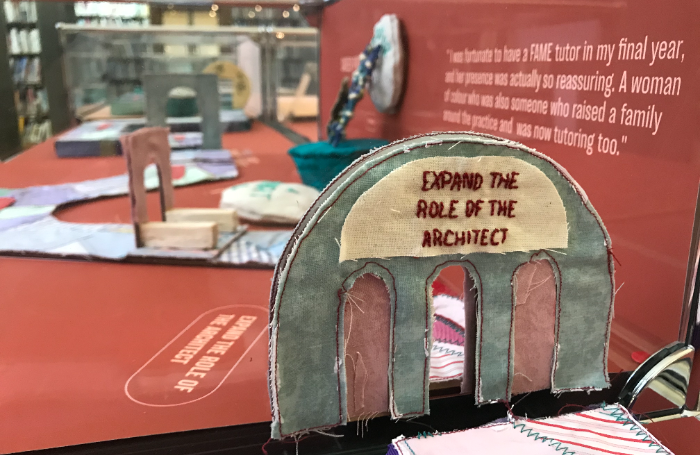Exposing the Barriers in Architecture, from a FAME (Female Architects of Minority Ethnic) Perspective
FAME collective’s research and exhibition are explored through an intersectional feminist lens to amplify the underrepresented voices in architecture.
This exhibition ran until Monday 20 May 2024.
RIBA Library, 66 Portland Place, London W1B 1AD
Monday to Friday: 11am to 5pm (Tuesday: 12pm to 7pm)
Closed: Saturday, Sunday and Bank Holidays

This exhibition was co-created by FAME collective, led and curated by Tumpa Husna Yasmin Fellows, founder of FAME collective.
Exhibition information
The design of the central and the primary exhibit was influenced by the ‘feminine embodiment practice’, from the concept of the Nakshi Kantha (traditional Bangladeshi diaspora embroidery technique). The concept involves re-using layers of recycled fabric and diverse materials, used to co-design the ‘pathways to success in architecture’, by delving into the narratives of the lived experiences of the barriers, from a FAME perspective
FAME (female architects of minority ethnic) collective’s research responded to an urgent need for understanding the barriers in architecture, for female architects of minority ethnic.
This research investigated the systems of discrimination in architecture and disadvantage experienced due to someone’s race, class and gender; and how these affect established practitioners, young scholars and students, from diverse backgrounds, knowledge and practices.
Research process
The research for this exhibition is explored through an intersectional feminist lens to amplify the underrepresented voices in architecture. It was conducted through a range of participatory methods and by engaging with the community of practitioners and students of architecture. Therefore, directly challenging institutions such as the Royal Institute of British Architects (RIBA), Architects Registration Board (ARB), universities and practices, by disseminating the findings and evidence-based research.
This research has been disseminated extensively to make it accessible to those in power. FAME collective’s research dissemination led to ARB's recent policy changes that came into place to remove the policy barriers in architecture by increasing access to the architecture profession for a wider demographic.
Ultimately, this research acts as a tool for activism; it reviews and highlights systemic inequities in architecture by documenting the lived experiences' narrative as a valuable form of research tool.
The research is supported by a critical review of the current data that reveals the state of intersectional barriers such as race, gender, and class at each stage of architecture education and the profession as a whole.
About FAME collective
FAME collective was founded to support women of diverse backgrounds and ethnicities in architecture and the built environment. They aim to raise awareness of the barriers, inequalities, and lack of diversity in architecture as well as demanding change.
Many thanks to the contributors of the exhibition: Tumpa Husna Yasmin Fellows, Hannah Ismail, Stefania Bellato, Grace Izinyon, Alifayah Jariwala, Nica Sabet, Reshma Upadhyaya, Iba Dagny Tony, Scarlett Rose Ryan, Tasnim Huda, Alex Ford
Additional thanks to the supporting members of the exhibition: Angela Vinci, India Whiteley, Marie Nevin, Lumie Okado, Hiten Odedra
Follow FAME collective on social media: Instagram, X (formerly Twitter), Facebook and LinkedIn.
Email: architecture.fame@gmail.com







